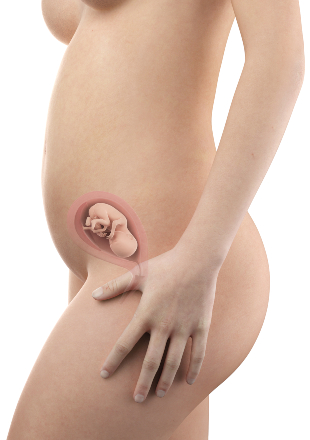Welcome to Week 16 of your pregnancy journey! By now, you may have started to notice some exciting changes in your body, and your baby is developing at an amazing pace. This week often feels like a turning point for many women—a time when pregnancy becomes more visible, and the reality of your growing family starts to truly sink in.
Your baby is about the size of an avocado this week. They’re around 4 to 5 inches long and growing quickly, practicing little movements and even making faces. Inside, their little muscles are getting stronger, and their heart is pumping at full speed—almost double your own heart rate!
On the outside, you may find that your energy levels are picking up again, and you might feel more like yourself than you did in the first trimester. Many women notice the famous “pregnancy glow” now, thanks to increased blood flow and changes in hormones. If you’re starting to show, you might need looser clothing, and that can be an exciting reason to shop for comfy maternity wear.

Your body is nurturing your baby in countless ways right now, even if you can’t feel every change. Some moms begin to feel those very first faint flutters, called “quickening.” If you haven’t felt anything yet, don’t worry—every pregnancy is unique, and those gentle movements may take a few more weeks to make themselves known.
As your pregnancy progresses, you might experience new symptoms. Some moms notice nasal stuffiness or mild swelling in their hands and feet. These changes are common, but it’s always good to mention any new or uncomfortable symptoms at your next checkup.
- This is a wonderful time to schedule any mid-pregnancy screening tests or ultrasounds your provider recommends.
- Regular gentle exercise like walking, swimming, or prenatal yoga can help you feel your best.
- Keep focusing on healthy meals and plenty of fluids to support your growing baby and your own well-being.
Most importantly, be gentle with yourself. Every emotion, every little change, is a part of your unique experience as a mom-to-be. Savor the moments—big and small—as you and your baby continue to grow together.
Your Baby’s Development This Week
At 16 weeks, your baby is making exciting leaps in their development, and you may be starting to notice more changes in yourself, too. Imagine holding a ripe avocado in your hand—that’s about the size of your little one this week! While they’re still small, lots of incredible things are happening inside your womb.
Your baby now measures roughly 11 to 12 centimeters (about 4.5 inches) from crown to rump and weighs close to 3 or 4 ounces. Over the coming weeks, your baby is about to experience a big growth spurt, with their body weight set to almost double. It’s a busy and active time for your tiny passenger!
Let’s look at some of the amazing ways your baby is growing right now:
- More expressive face: Your baby’s facial muscles are working hard to master new expressions. They can squint, frown, and even make small movements with their lips, getting ready for all those sweet smiles to come after birth.
- Sensitive senses: Their eyes, although still closed, can sense light shining through your belly. Try shining a flashlight on your stomach—your baby might squirm in response! Their ears are also shifting into place, and they’re starting to pick up the muffled sounds of your voice or music you play.
- Active movement: Around this time, your baby’s arms and legs are more coordinated. They’re stretching, tumbling, and even doing tiny flips, although you might not feel it quite yet—especially if this is your first baby. Moms who’ve been pregnant before may begin to notice those first gentle “flutters.”
- Fine hair for protection: A soft, downy layer called lanugo now covers your baby’s skin. This helps protect their delicate body and even helps keep them warm until they build up more fat later on.
- Hair and lashes sprouting: Eyebrows, lashes, and some hair on the head are starting to form, giving your baby their first hints of family resemblance.
- Developing organs: Your baby’s tiny heart and circulation system are running smoothly now, and organs like the liver and pancreas are practicing their important jobs. The lungs are also growing every day as your baby “practices” breathing by moving amniotic fluid in and out.
- Swallowing practice: Your baby is swallowing small amounts of amniotic fluid, which helps their digestive system mature and keeps things on track for healthy growth.
Even though most of this is hidden from view, every kick, swallow, and stretch helps your baby get stronger. It’s normal if you don’t feel anything yet—soon enough, your belly will share those gentle movements.
As your baby gets more active, continue looking after yourself with nutritious meals and regular checkups. Every healthy choice you make supports your baby’s new abilities, from growing eyebrows to bouncing around in their cozy aquatic world. Enjoy this fascinating stage—your little one is becoming more and more themselves every day!
Changes in the Mother’s Body
Reaching week 16 of pregnancy is an exciting point—many women notice their bodies beginning to change in new ways as they approach the halfway mark. By now, you may start to see and feel the gentle signs that your baby is growing stronger and your own body is working hard to support this incredible journey.
One of the most noticeable changes around week 16 is the shape of your belly. Your uterus is growing and is now about the size of a grapefruit, gradually rising out of your pelvis and creating a gentle, rounded bump. If you look in the mirror, you might notice your waistline disappearing, and your clothes feeling snugger around your middle. For many, this is when you officially “start to show.” Don’t worry if your bump is still small or just barely noticeable—every pregnancy is unique and timing can vary from person to person.
Your body is also producing more blood to nourish both you and your developing baby, which explains why you might have a healthy glow these days. Some women notice that their skin looks brighter, or their hair feels thicker and shinier than usual. This so-called “pregnancy glow” is a welcome change for many!
You might also observe subtle changes elsewhere. Many expectant mothers find that their nails grow faster or become stronger. However, it’s completely normal if you have the opposite experience—some women notice softer, more brittle nails. You could also experience some gum sensitivity while brushing or flossing, as hormonal changes can make gums more prone to swelling or bleeding. Remember to keep up good dental care, and don’t hesitate to ask your dentist for tips if your mouth feels more tender than usual.
Another difference you may notice is an increase in natural vaginal discharge. This thin, milky-white fluid is called leukorrhea and is the body’s way of keeping the birth canal clean and reducing the risk of infection. Unless it has an unusual color, odor, or causes discomfort, it’s all part of a healthy pregnancy. Simply wearing a panty liner can help you stay comfortable.
If you’ve been pregnant before, you might be among the lucky ones who start to feel the very first fluttery movements of your baby—often described as tiny bubbles or gentle taps. This early movement is called “quickening.” For first-time mothers, though, those first kicks and wiggles may not be noticeable just yet—so don’t worry if you haven’t felt anything. It will come in the following weeks, and it’s truly something to look forward to!
- Tip: As your body shape changes, you might want to transition to more comfortable or stretchy clothing. Investing in a good maternity bra and pants with an adjustable waistband can make a big difference in how you feel day-to-day.
- Hydration: With increased blood flow, staying well-hydrated is extra important. Keep a bottle of water handy and sip throughout the day to help with headaches and general well-being.
- Listen to your body: You might experience mild aches in your lower abdomen or hips as your ligaments stretch to accommodate your growing uterus. Gentle exercise, rest, and warm compresses (not hot!) can help ease this discomfort.
Above all, remember that every pregnancy is different. If you have any concerns—no matter how small—reach out to your healthcare provider. They’re there to support you every step of the way and want to ensure you feel confident and cared for as you continue this remarkable journey.
What to Expect at Your 16-Week Prenatal Checkup
Reaching 16 weeks of pregnancy is exciting! This is the time when both you and your baby are growing and changing in many ways. One of the best ways to make sure you and your baby are healthy is by going to your regular prenatal appointments. Here’s what usually happens during your prenatal visit at week 16—and why each step matters:
- Listening to Your Baby’s Heartbeat: Your healthcare provider will use a small handheld monitor (often called a Doppler) to listen for your baby’s heartbeat. Hearing those tiny thumps is often a special moment for parents. It’s also a helpful way to check that your baby is doing well.
- Measuring Your Growing Belly: Your provider may start measuring your belly from the top of your uterus down to your pubic bone. This helps track how quickly your baby and uterus are growing and gives clues about whether things are on track.
- Checking Your Weight and Blood Pressure: It’s normal to gain some weight at this stage—your doctor will monitor this, along with your blood pressure, to catch any signs of concerns like gestational hypertension. This careful watching helps keep both you and your baby safe.
- Urine and Blood Tests: Your provider might ask for a urine sample to check for things like proteins (which could signal issues to be followed up on) or infections. Sometimes, blood work is done to check your iron levels, look for signs of anemia, or screen for infections.
- Screening for Genetic Conditions (Optional): If you’d like, or if it’s suggested for your situation, your doctor might offer special blood tests like the “quad screen.” This test checks for certain genetic conditions and spinal cord problems. Some families may also talk about amniocentesis around this time, especially if there are higher risk factors. Always feel free to ask questions or discuss any worries with your provider—they’re there to help support you and your choices.
- Talking About How You’re Feeling: Your visit is also the perfect chance to bring up anything that’s been on your mind—whether it’s morning sickness that hasn’t let up, strange aches or pains, concerns about movement, or just questions about what comes next. No question is too small.
Looking after your health at 16 weeks means checking in on both your physical changes and your emotional well-being. Let your doctor or midwife know about any new symptoms, and don’t hesitate to ask for advice about staying comfortable—from tips for easing nasal stuffiness and sensitive gums to ways of handling increased discharge or headaches.
Remember, these checkups are about more than just numbers and tests—they’re a time for you to get reassurance, answers, and support. No matter what, you’re not alone on this journey. Your care team is ready to walk beside you every step of the way.
Nutritional Tips and Physical Exercise
By week 16, you might notice your appetite growing—and that’s perfectly normal! It’s an exciting stage where your baby is rapidly developing, and your body needs a mix of wholesome foods and gentle movement to stay healthy. Let’s explore some practical nutrition and exercise recommendations tailored for this phase of your pregnancy:
- Fuel Up with Colorful Meals: Try to include a rainbow of fruits and vegetables in your daily meals. For example, add chopped spinach to your morning omelet, snack on orange slices, or toss a handful of berries into some yogurt. These foods are packed with vitamins, fiber, and antioxidants that help both you and your baby stay healthy.
- Smart Snacking: It’s normal to feel hungry between meals. Instead of reaching for chips or cookies, go for wholesome snacks like whole grain crackers with hummus, apple slices with nut butter, or a handful of trail mix with unsalted nuts and dried fruit. These options provide steady energy and important minerals like magnesium and potassium.
- Healthy Fats for Baby’s Brain: Your baby’s brain and eyes are growing quickly, so include sources of healthy fats in your diet. Avocados, olive oil, walnuts, and chia seeds are excellent choices. Two or three times a week, enjoy fatty fish like salmon or sardines, which are safe and rich in omega-3s (just make sure they’re fully cooked).
- Focus on Digestive Comfort: As your belly grows, some moms notice heartburn or constipation. To stay comfortable, sip fluids throughout the day and include fiber-rich foods like oatmeal, pears, or lentil soup. Gentle movement and regular walks can also help keep things moving smoothly in your digestive system.
- Hydration Reminders: Pregnancy increases your need for water. Try to keep a reusable bottle nearby and take small sips often. If plain water gets boring, jazz it up with lemon slices, fresh mint, or a splash of 100% fruit juice.
- Dining Out Choices: Eating out? Choose grilled, baked, or steamed dishes over fried foods, and remember to ask for dressings or sauces on the side. Salads with beans, roasted veggies, or lean chicken make excellent meals.
- Safe and Enjoyable Exercise: Staying active helps with energy, mood, and muscle tone. Most moms can safely enjoy activities like walking, prenatal yoga, swimming, or gentle cycling. Find what feels good for you and aim for about 30 minutes most days of the week. Listen to your body—rest when you need to, and avoid anything that causes pain, dizziness, or makes you uncomfortable.
- Pelvic Floor Support: Consider adding simple pelvic floor exercises, like Kegels, to your daily routine. These gentle squeezes help prepare your body for birth and recovery afterward. Talk with your doctor or midwife if you need a demonstration.
- Group Classes and Support: If you enjoy company, look for prenatal fitness classes or walking groups in your area. Being surrounded by other expectant moms can give you encouragement and a sense of community.
Remember, every pregnancy is unique. Small, positive changes—like trying a new veggie or parking a little farther away for a short walk—can make a big difference over time. And if you’re unsure about any foods or exercises, your healthcare provider is always your best resource for guidance tailored to you and your baby.
Weekly Checklist
Congratulations on reaching 16 weeks! This is an exciting time as both you and your baby are going through important changes. Here are some gentle reminders and practical steps to help you feel your best and support your baby’s healthy development this week:
- Schedule your prenatal appointment (if you haven’t already). Your care provider will likely listen to your baby’s heartbeat and may measure your belly to check on your baby’s growth. Write down any questions or symptoms you want to discuss so you don’t forget!
- Notice new feelings. You might start to feel the first tiny flutters of your baby moving—some call this “quickening.” Even if you don’t feel anything yet, it’s perfectly normal, especially if this is your first pregnancy.
- Support your skin as your belly grows. Moisturize daily to help relieve itchiness as your skin stretches. Gentle creams or natural oils like cocoa butter can be soothing.
- Track your hydration. Keep a water bottle handy and sip often. Try flavoring your water with lemon or cucumber if that helps you drink more.
- Review your meals for calcium and vitamin D. Choose snacks like yogurt, cheese, fortified plant milk, or leafy greens to build strong bones for both you and your baby.
- Pay attention to posture. As your center of gravity shifts, standing and sitting tall helps prevent aches in your back and hips.
- Watch out for symptoms that need attention. While mild headaches or congestion are common, call your doctor if you notice strong pain, bleeding, fever, or other unusual changes.
- Try light activity most days. Walking, swimming, or gentle stretches can boost your mood and help with circulation. Listen to your body and rest when needed.
- Start or update your pregnancy journal. Jot down thoughts, hopes, and any sensations you notice. This can be a wonderful keepsake to look back on.
- Continue healthy habits. Keep taking your prenatal vitamins, avoid raw or undercooked meats, and steer clear of high-mercury fish and too much caffeine. Remember, balance and moderation are key.
- Care for your teeth and gums. Pregnancy hormones can make gums more sensitive. Brush and floss daily, and consider scheduling a dental checkup if you haven’t already.
Most importantly, treat yourself with kindness and patience. Every pregnancy is unique, and even small self-care steps can make a big difference this week!
When to Call Your Doctor
Every pregnancy is unique, and it’s normal to have questions or concerns. Most changes you feel at Week 16 are part of your body’s healthy adjustment as your baby grows. Still, there are some symptoms that deserve careful attention. Reaching out to your healthcare provider for support is always the right choice if something feels unusual or worrying. Here are some important signs to watch for, along with guidance on when to call your doctor:
- Heavy Bleeding: While spotting can happen, continuous or bright red bleeding—especially if you need to change a sanitary pad in an hour—should be checked right away.
- Severe or Lasting Abdominal Pain: Mild pulling or stretching is normal, but strong cramps, sharp pain, or discomfort that doesn’t go away requires a call to your provider.
- Sudden Swelling: Noticeable swelling of your face, hands, or around your eyes that comes on quickly can be a sign of a more serious condition and should not be ignored.
- High Fever: If your temperature goes above 100.4°F (38°C) and won’t go down, or you feel chills and body aches, contact your doctor—especially if accompanied by other symptoms.
- Burning When You Urinate or Trouble Passing Urine: A urinary tract infection can be common in pregnancy but shouldn’t be left untreated. Let your provider know about pain, burning, or difficulty passing urine, or if your urine looks cloudy or smells strong.
- Vision Changes: New or sudden problems with your eyesight, such as blurriness, sparkles, or seeing spots, should be discussed with your doctor as soon as possible.
- Unusual Headaches: Headaches that are severe, come on suddenly, or last for hours—especially when paired with dizziness or vision changes—should always be checked.
- Significant Decrease in Early Pregnancy Symptoms: If breast tenderness, nausea, or other pregnancy symptoms suddenly fade and you’re concerned, your doctor can help evaluate what’s happening.
- Foul-Smelling or Itchy Vaginal Discharge: Some discharge is normal, but if there is a strong odor, itching, or a color change (yellow, green, or gray), reach out for advice as it could be a sign of infection.
- Fluid Leaking: If you notice a sudden gush or steady trickle of clear fluid from your vagina, contact your healthcare provider, as this could mean your “water” has broken early.
- Feeling Unwell Without a Clear Reason: If you just don’t feel right—too tired to function, feeling faint often, or having trouble catching your breath—listen to your body and check in with your medical team.
Remember, you know your body best. If you’re ever unsure, it’s perfectly okay to call your doctor’s office, even if it turns out to be nothing serious. Your peace of mind matters, and your care team is there to support you and your baby every step of the way.
Preparations for Baby
As you reach 16 weeks, it’s a wonderful time to begin gently planning for the arrival of your baby, both emotionally and around your home. This stage is about planting seeds—small steps that help you and your loved ones feel more connected and ready for the changes ahead. Here are some supportive tips to help you prepare:
- Build your support circle: Whether it’s family, friends, or a community group, now is a good time to reach out. Consider connecting with other expectant moms, either online or locally. Support and shared experiences can make the journey a lot smoother.
- Start dreaming up baby’s space: You don’t need to set up a nursery just yet. Instead, think about where your baby will sleep in those early months—maybe clearing a corner in your room or deciding what essentials you’d like nearby for those first weeks home.
- Take care of your mindset: Pregnancy brings lots of feelings. Try journaling your thoughts, hopes, or even worries. If you have a partner, talking together about your visions for parenthood can help you feel more connected and confident as a team.
- Create a questions list for your care team: Jot down anything you’re curious about for your next prenatal visit—nothing is too small or silly. Being prepared can help ease nerves and makes sure you get the answers you need.
- Organize your paperwork: Now’s a great time to start a simple folder (paper or digital) for medical info, appointment notes, and details about your insurance or leave from work.
- Enjoy small shopping steps: If you feel like browsing, begin with the basics, such as a comfy outfit for the hospital or a special book to read aloud. There’s no rush to stock up—just enjoy the process.
- Plan for self-care breaks: Taking time for yourself is as important as planning for the baby. A relaxing bath, a short walk, or listening to calming music can give you energy and peace of mind during this exciting time.
Remember, preparing for your baby is a gentle, step-by-step process—not a race. Celebrate the small milestones and trust that, with time, you’ll have everything you need in place. The loving environment you’re creating is already your baby’s best start.
Citations and References
- American College of Obstetricians and Gynecologists (ACOG) – Offers evidence-based guidance on prenatal visits, screening protocols, weight gain, and nutrition in the second trimester. Visit Source
- Mayo Clinic – Details key fetal developmental milestones and typical maternal changes at 16 weeks, including expected checkups and symptoms. Visit Source
- Centers for Disease Control and Prevention (CDC) – Covers nutrition, recommended supplements (like folic acid and iron), and tips for healthy pregnancy practices. Visit Source
- World Health Organization (WHO) – Provides global recommendations for antenatal visits, micronutrient supplementation, and important dietary guidelines. Visit Source
- Cleveland Clinic – Outlines fetal growth, organ development, maternal symptoms, and prenatal screening options at 16 weeks. Visit Source
- National Institutes of Health (NIH) – MedlinePlus – Summarizes fetal developments, maternal body changes, and standard care recommendations at this stage. Visit Source
- NHS (UK National Health Service) – Details second trimester fetal changes, lifestyle advice, and guidance on routine checkups and healthy eating. Visit Source










